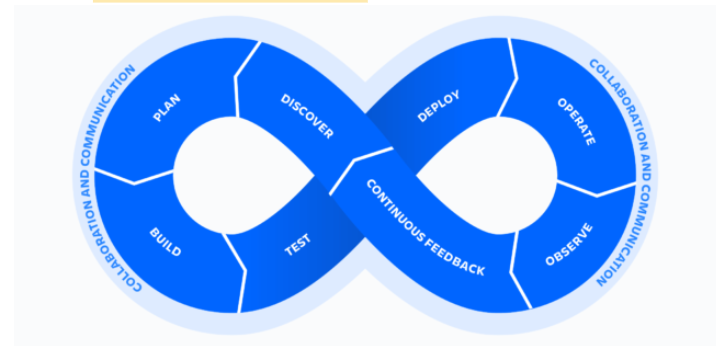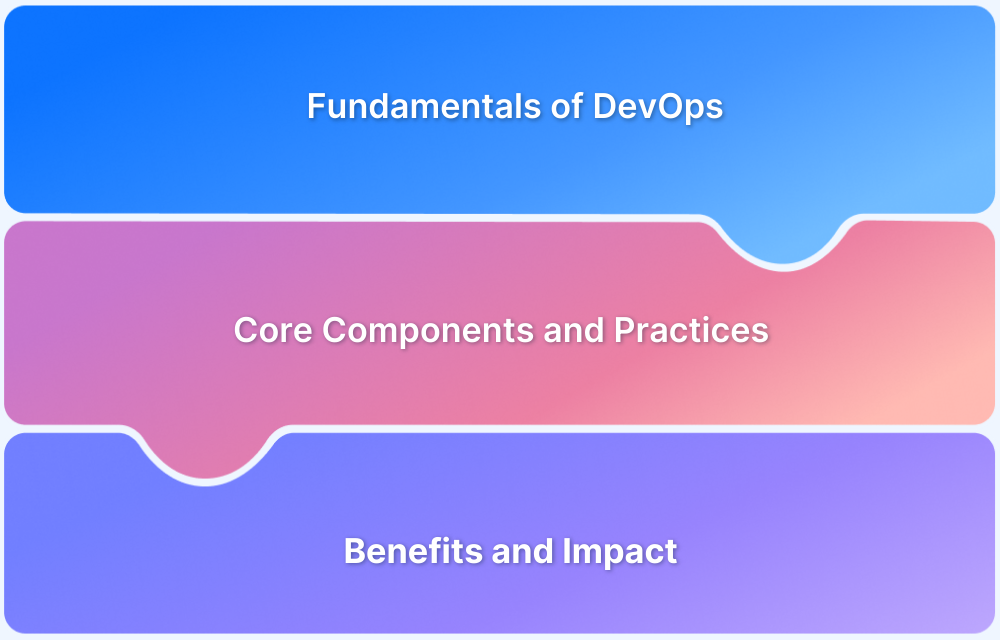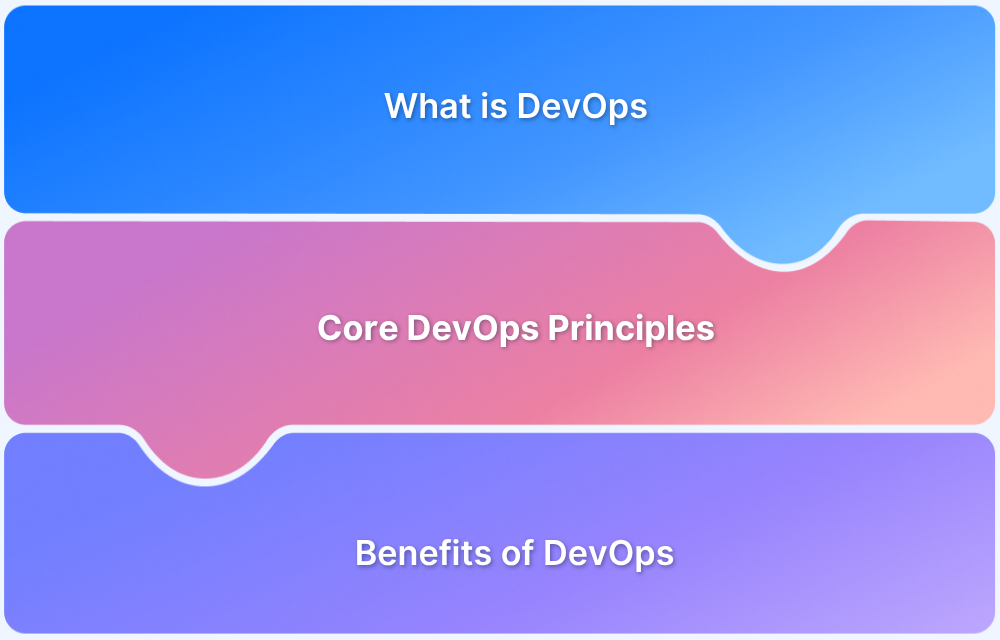Software development combines code, tools, design, and practices into a cohesive process aimed at delivering applications quickly and efficiently. Irrespective of whether creating new products or improving existing ones, speed is important. DevOps captures this need, enhancing collaboration and accelerating high-quality delivery.
This article explains the core benefits of DevOps and why you must adopt it.
What is DevOps?
DevOps is a set of practices that combines software development (Dev) and IT operations (Ops) to improve collaboration, automate workflows, and accelerate the software delivery process. By bridging the gap between development and operations teams, DevOps enables continuous integration, continuous delivery (CI/CD), and faster, more reliable releases.
Why is DevOps Important?
DevOps is important because it helps organizations deliver software faster, with higher quality and less risk.
DevOps promotes a culture of collaboration and automation. It allows teams to respond quickly to customer needs, adapt to changes, and continuously improve products. It also reduces downtime, enhances security, streamlines the release process, and gives companies a competitive edge.
Top 15 Core Benefits of DevOps
1. Stabilizes the Workplace
DevOps reduces the stress of constant updates and changes. This creates a more stable work environment. Quick DevOps feedback loops and efficient processes help teams work together smoothly, keeping operations balanced.
2. Enables Faster Deployment
Faster deployment lets you launch new features and improvements more often. This keeps customers happy and helps you stay competitive. DevOps streamlines deployment, making updates consistent and reliable.
Read More: What is DevOps Pipeline? How to build one?
3. Improves Product Quality
DevOps builds better products by gathering feedback frequently and testing throughout development. Automation ensures issues are caught early. This lets teams focus on delivering high-quality features and reduces costly fixes.
4. Quick and Reliable Issue Resolution
DevOps makes problem-solving faster and more reliable. Continuous monitoring and smaller, frequent releases help teams catch and fix issues quickly. This reduces downtime and keeps software running smoothly.
5. Increases Agility and Flexibility
DevOps encourages collaboration across teams, breaking down silos and creating flexibility. This adaptable work environment lets companies respond to changes quickly and stay competitive.
Read More: DevOps Testing Strategy
6. Encourages Innovation with Automation
By automating repetitive tasks, DevOps frees up teams to think creatively. With fewer manual tasks to manage, developers can focus on new ideas and innovations, making work more rewarding.
7. Ensures Continuous Delivery
DevOps enables teams to deliver updates and new features continuously by making quality and reliability a shared priority.
With automated testing, streamlined workflows, and close collaboration, each code change is thoroughly tested and quickly deployed. This approach allows organizations to release updates at a faster pace, providing users with frequent improvements while maintaining stability and minimizing risk.
8. Reduces Production Costs
DevOps combines updates and maintenance, improving coordination and reducing costs. By preventing costly rework, DevOps makes better use of resources. This boosts productivity and profitability.
9. Maximizes Productivity with Transparency
DevOps fosters open communication and collaboration. It reduces time spent on redundant tasks. When everyone can work on what matters, productivity goes up, and team members find more meaning in their work.
10. Minimizes Errors
DevOps catches mistakes early with frequent code releases and continuous testing. The shorter development cycle allows issues to be identified and fixed quickly. This helps teams avoid major problems and maintain software quality.
11. Enhanced Security and Compliance
DevOps integrates security practices (DevSecOps) throughout the development lifecycle. It ensures that security is prioritized from the start.
Automated compliance checks and security protocols protect sensitive data, reducing vulnerabilities and safeguarding the software.
Read More: DevOps vs DevSecOps
12. Increased Customer Satisfaction
By accelerating release cycles and responding quickly to user feedback, DevOps helps deliver a more user-focused product.
Continuous updates and improvements increase customer satisfaction as end-users receive new features and bug fixes more frequently.
13. Improved Collaboration Across Teams
DevOps creates a culture of shared responsibility and open communication between development, operations, and other teams.
This collaboration reduces bottlenecks and creates a more cohesive environment. This allows teams to work together more effectively and productively.
14. Streamlined Resource Management
With automation and streamlined workflows, DevOps helps teams use resources wisely. By cutting out repetitive tasks and optimizing processes, organizations can save time and make better use of their infrastructure and talent.
15. Continuous Monitoring and Real-Time Insights
DevOps includes continuous monitoring tools that provide real-time feedback on system performance and user interactions. Teams can spot and address issues immediately, leading to a smoother, more reliable user experience.
DevOps Model in an Enterprise
Enterprises are starting to see the value of DevOps as a result of the increased focus on developing skills for delivery and effective software development.
So when we say DevOps streamlines processes, how different is it from agile, considering that the latter focuses on reducing delivery time? While DevOps emphasizes on identifying ways to streamline and improve existing/new processes to maximize efficiency and increase automation, Agile focuses on recognising and building features that match the user’s expectation.
DevOps primarily looks at improving consistency, stability, and planning efficiency. It merges cross-functional teams to trigger software development and delivery. Agile, on the other hand, is specific to the development team and involves steps to increase their productivity.
Also Read: How do Agile and DevOps interrelate?
So, we can safely say that the ultimate goal of DevOps is optimisation, agree? DevOps works towards optimizing business value by merging the two keys – streamlined processes and velocity of the processes. That’s how it streamlines business processes.
This optimization of business value flow can be understood in terms of:
- The Ability to Deliver Value
- Learning from Experimentation
- Measuring what matters
- Faster Software Product Velocity
- Improving the value chain
- Moving away from silos
- Encouraging Cross-Functionality in teams
Software reliability, availability, and performance are all supported by the underlying infrastructure as it is initially designed, tested, and then put into production.
DevOps Adoption
DevOps is a collection of procedures, tools, methods, and even individuals with the goal of enhancing teamwork and facilitating quicker, more dependable product deliveries. The goal of a DevOps environment is to encourage documentation, automation, and communication while fostering teamwork.
Teamwork is Key
In traditional setups, developers and QA teams work separately, leading to delays, errors, and blame-shifting. DevOps solves this by aligning developers, QA, and Ops into cross-functional teams that collaborate from the beginning. This shared ownership and early issue detection streamline deployments, improve quality, and create an efficient development cycle.
Read More: Why DevOps Teams Need Cloud-Based Solutions
Automation is the Answer
Automation plays a key role in the execution of DevOps successfully. In order to automate significant portions of the deployment and development pipeline, it is crucial to employ the appropriate test automation frameworks, established in the appropriate toolchains. But DevOps automation is more than just using tools.
It begins with a shift of perspective among all parties concerned and employs tools to carry out that perspective in the development and testing of software. You might want to know why DevOps recommend shift left principles.
Conclusion
Using DevOps gives you an advantage over alternative approaches that have recently become more widely used. However, each business and individual must acknowledge that the shift will take time. It requires everyone to realize it. Needless to say, your teams will remain committed to developing their abilities if they recognize the benefits of DevOps model.
However, to make the most out of the best practices of DevOps, it’s imperative to improve the testing strategy of DevOps.
- Induct the correct skillset into the team
- Create an optimal Continuous Testing pipeline
- Leverage the power of automation for a quick turnaround
- Ensure Continuous Monitoring processes are set up
Coming to testing of DevOps, BrowserStack is developed keeping in mind the essentials needed to build a CI/CD and DevOps-empowered testing pipeline. With a cloud Selenium grid, enabling test automation on real browsers and devices is seamless.
Additionally, benefit from BrowserStack’s integrations with all major CI/CD tools, thus simplifying testing protocols for QAs and developers.
Useful Resources for DevOps
Understanding DevOps:
- What is DevOps
- DevOps Shift Left Testing: A Detailed Guide
- What is the ultimate goal of DevOps?
- Benefits of DevOps
- What is DevOps Configuration Management?
- What is Continuous Delivery in DevOps?
- What is a DevOps Pipeline? How to Build One
- What is DevOps Observability (Importance & Best Practices)
- DevOps Testing Strategy
- How to improve DevOps Feedback Loop
- Python For DevOps: An Ultimate Guide
- What is DevOps Automation and How is it Helpful?
- Importance of DevOps Team Structure
- The Role of QA in DevOps
- Top Challenges in DevOps and How to Solve Them
- Top 21 Monitoring Tools in DevOps for 2024
Know the difference:
- DevOps vs Scrum: Key Differences
- Breaking Down MLOps vs DevOps: Similarities and Differences
- DevOps vs SysOps: What are the major differences
- DataOps vs DevOps: Key Differences
- TechOps, DevOps, and NoOps: Which one is right for you?
- DevOps vs CloudOps: How are they different
- DevOps Engineer vs Full Stack Developer: Differences
- Synchronize Business Analysis, DevOps, and QA with Cloud Testing


 Source
Source



